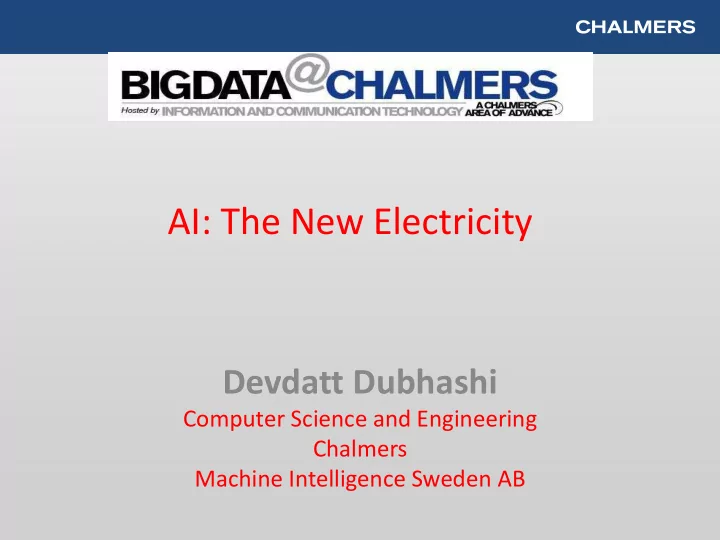

AI: The New Electricity Devdatt Dubhashi Computer Science and Engineering Chalmers Machine Intelligence Sweden AB
AI: the New Electricity “AI is the new electricity. Just as electricity transformed industry after industry 100 years ago, I think AI will do the same.” Andrew Ng, Stanford, Baidu, Coursera
AI
• “I believe that at the end of the century the use of words and general educated opinion will have altered so much that one will be able to speak of machines thinking without expecting to be contradicted.” ― Alan Turing, Computing Machinery and Intelligence (1950)
Every aspect of learning or any other feature of intelligence can in principle be so precisely described that a machine can be made to simulate it. An attempt will be made to find how to make machines use language, form abstractions and concepts, solve kinds of problems now reserved for humans, and improve themselves. We think that a significant advance can be made in one or more of these problems if a carefully selected group of scientists work on it together for a summer. John McCarthy, Dartmouth Workshop 1956
GOFAI (1960-90) • Knowledge Representation • at(restaurant,Alice) • First Order Logic and Theorem • at(restaurant,Bob) Proving • at(restaurant,Carol) • works_at(restaurant,Carol) • has_job(restaurant,waitress,Carol) • orders(Bob,pizza) • orders(Alice,sushi) • forall X,Y,Z. orders(X,Y) and has_job(restaurant,waitress,Z) -> serves(Z,X,Y) • serves(Carol,Bob,pizza) serves(Carol,Alice,sushi)
Statistical Machine Learning 1990- • Probabilistic models • Statistical learning and inference • Data driven (no hardcoded rules)
Deep Learning 2005-
Why Now? Convergence of Technologies • Data sensing, acquisition revolution • Rapid increase in computing power • Novel algorithms • Software frameworks
Yann LeCun, NIPS 2016
Google Translate reduce translation errors across its Google Translate service by between 55 percent and 85 percent
AI Revolution in NLP
Supervised Learning Need lots of training data • EU Parliament documents in multiple languages • Bibles in multiple languages
Word Embeddings
Word senses and Machine Translation
Unsupervised Learning of Word senses Learn the different senses of a word from raw text without any training data
Document summarization Automatically extract a Summary of documents From raw text without any supervision.
Reinforcement Learning
AIphaGoZero: AI Tabula Rasa Trained from scratch without any Human input only for 36 hours and beat the previous version 100-0!
Learning to Communicate • Agents interact sending messages to solve a common task. • Invent a language grounded in real world objects E, Jorge, M. Kageback and E. Gustavsson, “Learning to play Guess Who? And inventing a Grounded Language as a Consequence”, NIPS Deep RL Workshop (2016)
AI: NEW ELECTRICITY
Electricity and AI as General Purpose Technologies • Wide scope for improvement and elaboration • Application across a wide range of uses • Potential for use in a wide variety of products and processes • Strong complementarities with existing or potential new technologies
Easy to Use and Improve
“ Electricity , communication, manufacturing. I think we are now in that phase where AI technology has advanced to the point where we see a clear path for it to transform multiple industries.”
Data is the New Oil!
X+AI
Complementary Technologies CRISPR/CAS9 Gene Editing for Additive Manufacturing Life Sciences
Music itself is going to become like running water or electricity.
• AI will contribute as much as $15.7 trillion to the world economy by 2030 (PwC) • $6.6 trillion from increased productivity as businesses automate processes and augment with new AI technology, and $9.1 trillion from consumption side- effects as shoppers snap up personalized and higher- quality goods
BigData@Chalmers Seminars
Data Science: Algorithms
Data Science: Large Scale Systems
Data Science: Optimization
Recommend
More recommend